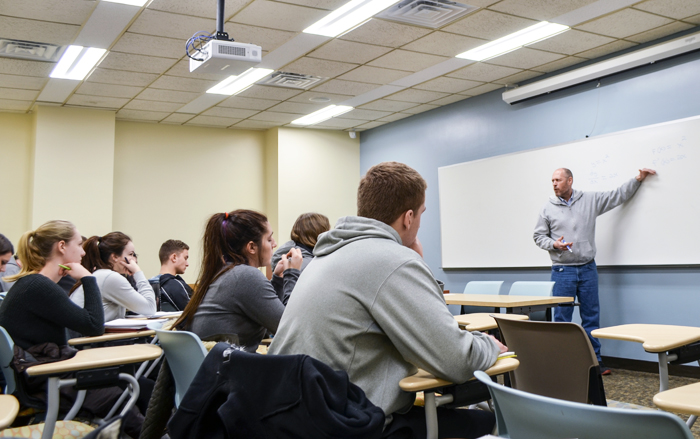
By: Lauren Zawatski | For The Duquesne Duke
“I lost my homework!” “I have the flu.” “The power went out and I couldn’t finish my essay!”
Sound familiar?
For professors and students alike, the excuses above may be commonplace. When assignments vanish or attendance wanes, students will point to various reasons to explain an issue. Although many excuses tend to be fairly ordinary, at times they can verge into eccentric and even candid territory, as numerous Duquesne faculty and students reveal.
“I had one that stands out in my memory,” Lynn Purse, who has taught within Duquesne’s Mary Pappert School of Music for 25 years, said. “This was in the days when we used 3 inch floppy disks. I had a student who didn’t have her work done, and she said her mom used the floppy disk to scrape ice off her windshield!”
Sophomore physician assistant major Aaron Thomas heard of a fellow student who claimed to be unable to locate a pair of clean pants, and thus did not attend class.
A professor who wishes to remain anonymous disclosed an excuse a student had given in the past that falls into a category of its own.
“There was a student who wasn’t doing well and was falling behind, and she gave me the excuse that she had been working as a pole dancer. She was having a hard time in general,” the professor said.
However, despite the implausibility of most excuses, there are genuine instances when they become factual, rather than fictitious. When such occasions occur, excuses quickly turn from outrageous to earnest.
Petros Christofi, who has been a professor in the School of Business for 31 years, received an excuse from a student stating he had been convicted of a crime and was sentenced to jail time, and thus that was why he had not been showing up for class. The story proved to be true, Christofi said.
Fifth year pharmacy student Sydney Kehr also understands how unbelievable excuses can become reality.
“My grandparents were killed in a car accident a week before finals,” she said. “I was terrified to even tell any of my professors. I was like, ‘It’s going to be so many hoops to jump through.’ It ended up working out, but sometimes crazy things do happen,” she said.
Duquesne professors all have varied positions on the matter of receiving excuses. Several consider it to be crucial to limit excuses, and thus are less lenient when they do arise, while others allow students to decide for themselves what excuses, if any, are adequate.
Ronald Dick, a School of Business professor, explained that he finds the idea of creating excuses and skipping class strange. From a business standpoint, he noted that unlike all other paid services, college is the only one where the consumers are satisfied with less of it.
“You’re paying more for less,” Dick said.
Linda Coleman, a professor in the School of Leadership and Professional Advancement, thinks that professors should be wary when it comes to accepting excuses. She thinks allowing students the benefit of the doubt is appropriate, but it is equally important for professors to be mindful. Coleman once had a student consistently giving her an excuse concerning health issues within his family. Eventually, however, he admitted the excuse was false and he was just struggling to keep up with the course load.
“I thought it was kind of cool that he was eventually just honest about it,” she said. “Sometimes excuses can insult your intelligence, but I like to give students the benefit of the doubt; things happen in life.”
First year journalism and multimedia arts professor Robert Healy III also believes there should be standards when it comes to excuses, but, likewise, there are some he will not accept.
“You have to draw a line at some point. If someone misses class because of a trip for pleasure it’s inexcusable,” he said. “I think attendance is a huge part of the learning experience. So much of life is just showing up.”
Christofi has a slightly different take than most professors on excuses: he approves all of them.
“It’s up to you if you want to come to class,” he said. “It’s their [students’] money, their time. That’s why I don’t ask.”
Additionally, Duquesne students also have their own views and advice on excuses that may seem surprising, and perhaps firm. Instead of skillfully crafting excuses to give to professors, most believe it is better to just be a dedicated student.
“I understand if something important happens, but you basically have a job to do,” John Yakim, a freshman economics and finance major said. “Quit looking for bailouts.”
Jeremy Tock, a freshman physician assistant major, has a similar stance on giving excuses. Rather than offering excuses, he believes students should simply do the work assigned to them.
“Quit making excuses. Do your work,” he said. “What I think about excuses is what one of my teachers said once: ‘Excuses are like buttholes, everyone has one, and they all stink.’”
Overall, instead of giving excuses, both students and professors agree that the best option is to simply be straightforward and hard working. Although strange circumstances may develop and result in necessary excuses, the majority of the time excuses prove unnecessary.
“If you get caught in a lie, it reflects badly on your character. Just get in a habit of telling the truth,” Alicia Paterno, a professor in the Bayer School of Natural and Environmental Sciences said. “Honesty is the best policy.”



